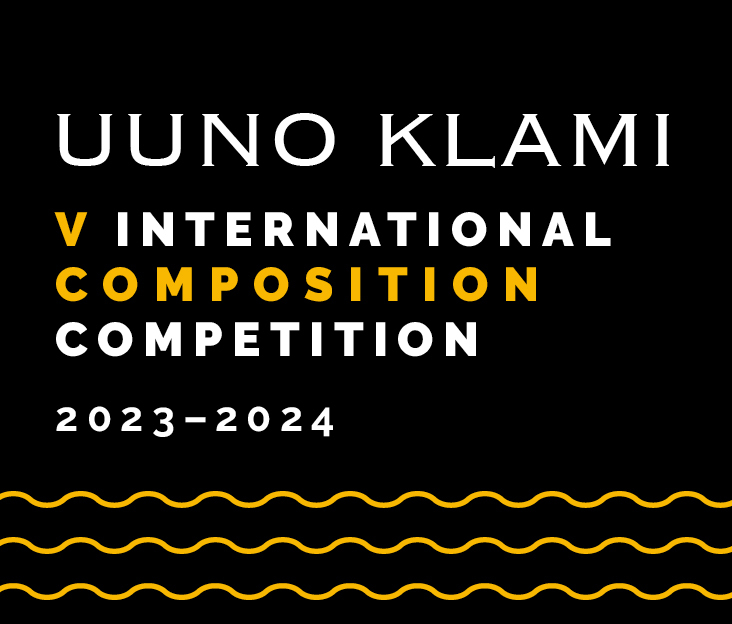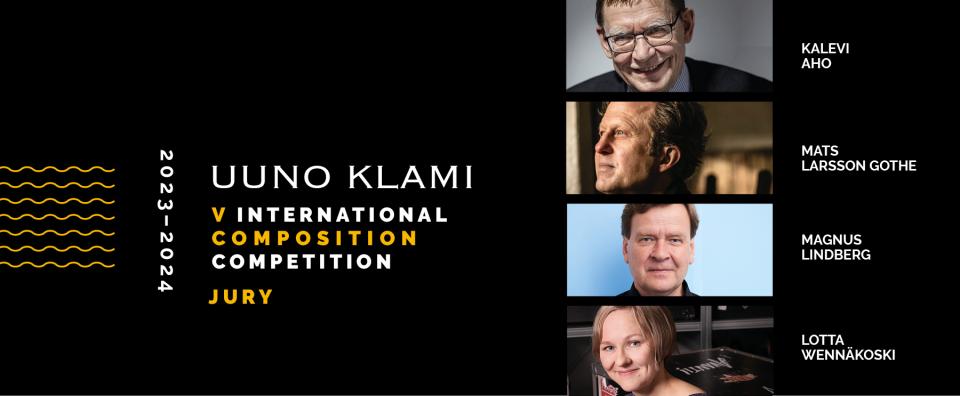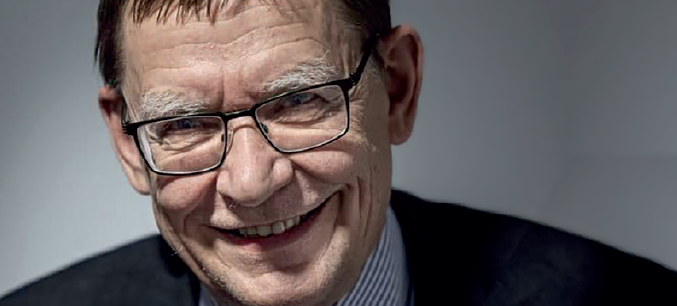
Kalevi Aho (b.1949), one of Finland’s foremost contemporary composers, was born in Forssa in southern Finland on March 9, 1949. He commenced his violin studies in his home town at the age of ten, and his first compositions also date from this time. From autumn 1968, he studied the violin and composition at the Sibelius Academy in Helsinki; his composition teacher was Einojuhani Rautavaara.
After graduating as a composer in 1971, Kalevi Aho continued his studies in Berlin (1971–1972) as a pupil of Boris Blacher at the Staatliche Hochschule für Musik and Darstellende Kunst. From 1974 to 1988 he was a lecturer in musicology at Helsinki University, and from 1988 until 1993 a professor of composition at the Sibelius Aca-demy. As of autumn 1993, he has worked in Helsinki as a freelance composer.
The focus in Aho’s compositions is on large-scale orchestral, chamber and vocal works; to date his output includes five operas (1978–2013), 17 symphonies (1969–2017), 39 concertos (1981–2022), three chamber symphonies for string orchestra, other orchestral and vocal music and a large amount of music for chamber ensembles and solo instruments.
He has also made a number of arrangements and orchestrations of works by other composers. The most important of these is the completion of Uuno Klami’s unfinished ballet Pyörteitä (Whirls). Since 1992, Aho has been composer-in-residence of the Lahti Symphony Orchestra, and in 2011 the Orchestra awarded him the title of Honorary Composer.
In Finland, Kalevi Aho also has a reputation as a keen writer on music, some times taking a critical stand on Finnish cultural policy. He has occupied a number of important positions in Finnish cultural life.
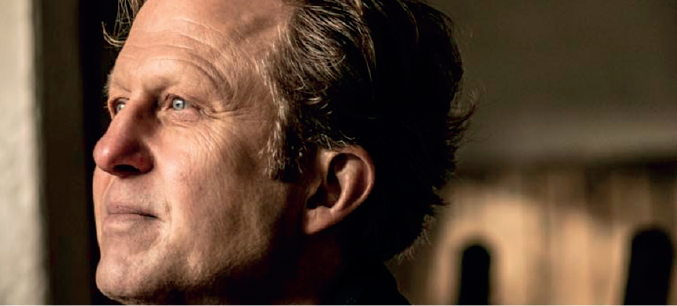
Mats Larsson Gothe (b. 1965) has been an active full-time composer of works in many genres since 1995, with an emphasis on orchestral music and solo concertos, but also chamber music and not least opera. He had a major breakthrough with his first full-length opera ’Poet and Prophetess’ at NorrlandsOperan in 2008; the prize-winning ’Blanche and Marie’ aroused widespread attention at its premiere in autumn 2014 and was nominated for the 2015 International Opera Awards.
In his solo concertos Larsson Gothe has worked with soloists including Christian Lindberg, Torleif Thedéen and others, as well as the percussion ensemble Kroumata. Another important interpreter of his music is the singer Anna Larsson. Orchestras such as the BBC Symphony, Gothenburg Symphony and Royal Stockholm Philharmonic have programmed his music. From 2009 to 2012 Larsson Gothe was composer-in-residence at NorrlandsOperan, and from 2014 to 2015 with the Västerås Sinfonietta. In April 2016 the Stockholm Concert Hall devoted its “Composer Weekend Festival” to his music.
Stylistically, Larsson Gothe started off in the Stravinsky tradition, from which he has continued to develop. Furthermore, studies in Italy (with Atli Ingólfsson) have lent his music a scintillating quality of Mediterranean vigour. Emotional power of expression is fused with neoclassical features and a strong sense of pulse, which makes his music very intense. His more recent orchestral music has a dramaturgical structure reflecting his work with opera.
Larsson Gothe trained as a music teacher at the Ingesund College of Music, with trumpet and piano as his main instruments, continuing with composition at the Royal College of Music in Stockholm with Sven-David Sandström, Daniel Börtz and Pär Lindgren and further studies with Kalevi Aho at the Sibelius Academy in Helsinki. He has been awarded a number of prestigious distinctions, including the Christ Johnson Prizes (2003 and 2018), the Bo Wallner Prize (2009), Svenska Dagbladet’s Opera Prize (2015) and the Swedish Music Publishers’ Award (2015 and 2022).
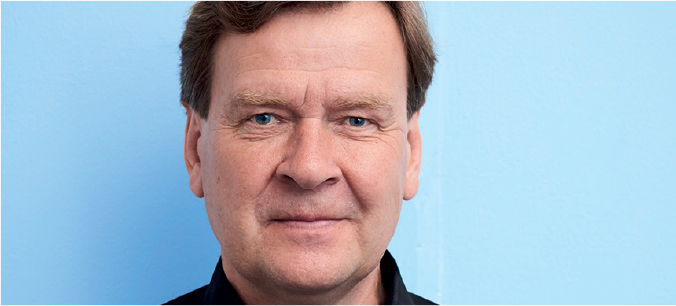
Magnus Lindberg (b. 1958) is one the leading musical influences and composers of his generation in Finland today. He studied composition with Einojuhani Rautavaara and Paavo Heininen at the Sibelius Academy. The latter encouraged his pupils to look beyond the prevailing Finnish aesthetics, and to explore the works of the European avant-garde. This led around 1980 to the founding of the informal grouping known as the Ears Open Society which aimed to encourage a greater awareness of mainstream modernism.
Lindberg’s compositional breakthrough came with two large-scale works, Action-Situation-Signification (1982) and Kraft (1983–85), which were inextricably linked with his founding of the experimental Toimii Ensemble. His works at this time combined experimentalism, complexity and primitivism. During the late 1980s, his music transformed itself towards a new modernist classicism.
Lindberg’s output has positioned him at the forefront of orchestral composition, including the concert-opener Feria (1997), large-scale statements such as Fresco (1997), Cantigas (1999) and Sculpture (2005), and concertos for cello (1999 and 2013), clarinet (2002) and violin (2006 and 2015). Works also include Seht die Sonne (2007), commissioned by the Berlin Philharmonic, his first choral-orchestral work, GRAFFITI, premiered in Helsinki in May 2009, and Era (2012) for the 125th anniversary of the Amsterdam Concertgebouw Orchestra.
Lindberg was Composer-in-Residence of the New York Philharmonic between 2009 and 2012, with new works including Al Largo for orchestra and Piano Concerto no. 2. He was appointed Composer in Residence with the London Philharmonic Orchestra for three years from the 2014/15 season. Recent works have included TEMPUS FUGIT, commissioned by the Finnish Radio Symphony Orchestra to celebrate the centenary of Finnish Independence in 2017, Serenades for the Chicago Symphony Orchestra and Piano Concerto No. 3 premiered by Yuja Wang and the San Francisco Symphony under Esa-Pekka Salonen. Lindberg’s music has been recorded on the Deutsche Grammophon, Sony, Ondine, Da Capo and Finlandia labels. Magnus Lindberg is published by Boosey & Hawkes.

Lotta Wennäkoski (b. 1970) studied composition and music theory with Eero Hämeenniemi, Kaija Saariaho and Paavo Heininen at the Sibelius Academy and with Louis Andriessen in The Netherlands. Early in her career she also studied the violin, theory and folk music at the Béla Bartók Conservatory in Budapest (1989–1990).
Though often described as a lyricist composer, Lotta Wennäkoski has with time adopted an idiom marked by more dramatic and even humorous shades. Timbres, textures, and diaphanous weaves occupy a major role in her music: “Wennäkoski has a gift for building mighty sound spaces and sonorities out of little mole-
cules,” write the Helsingin Sanomat critic of Sedecim in 2021. Her real breakthrough came in 2017, with the rollicking orchestral Flounce commissioned for the last night of the BBC Proms; the work has already had some forty performances, in Finland and abroad.
Recent works by Lotta Wennäkoski include the chamber piece Hele (2018) commissioned for members of the Los Angeles Philharmonic Orchestra, Om fotspår och ljus (Of Footprints and Light, 2019) for the Helsinki Variations cycle commissioned by the Helsinki Philharmonic Orchestra, and the quartet Pige (2021) commissioned by the Danish String Quartet and premiered at Carnegie Hall. Wennäkoski was the Finnish Radio Symphony Orchestra’s Theme Composer for the 2021/2022 season, and her harp concerto Sigla written for Sivan Magen was first heard in May 2022. Other recent compositions include the opera ’Regine ’ about the woman betrothed to the philosopher Søren Kierkegaard for the Savonlinna Opera Festival.
The Finnish Radio Symphony Orchestra has released two albums of music by Wennäkoski on the Ondine label: Soie (2015) and Sigla (February 2023). Lotta Wennäkoski was awarded the State Prize for Music in November 2020 has been appointed Artist Professor for the period 2022 to 2026.
In addition, conductor Ernest Martínez Izquierdo will do the evaluation work in the jury at a later stage.
